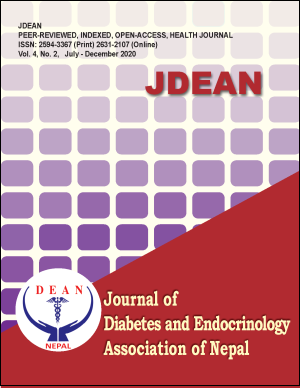Use of parathyroid hormone analog (Teriparatide) in patients with chronic hypoparathyroidism after total thyroidectomy: a case report
DOI:
https://doi.org/10.3126/jdean.v4i2.34603Keywords:
Postoperative Chronic Hypoparathyroidism, Recurrent Hypocalcemia, TeriparatideAbstract
Background: Hypoparathyroidism and hypocalcemia is a common postoperative complication, after total thyroidectomy due to thyroid cancer. Standard treatment with supplementation of calcium and vitamin D analogs, usually treat this condition. In some patients, hypoparathyroidism is refractory to standard treatment plus intermittent calcium infusions with persistent low serum calcium levels and associated clinical complications. Attempts have been made to add recombinant human parathormone (rhPTH) to the treatment schedule. To our knowledge, this is the first time that we encounter a patient suffering from treatment-refractory postsurgical hypoparathyroidism who was treated with teriparatide.
Case presentation: Male (31 years) with postoperative hypoparathyroidism, after total thyroidectomy due to papillary thyroid cancer, several weeks after the surgery still required intermittent intravenous calcium infusions because of tetany symptoms. He had persistent hypocalcemia despite oral treatment with up to 1 ug calcitriol and 4 g calcium per day necessitating additional intravenous administration of calcium gluconate intermittently. This time, Teriparatide treatment was introduced at once daily 50 micrograms (mcg) subcutaneous injection, while doses of calcium and calcitriol were gradually decreased depending on the response of serum total and ionized calcium taken periodically, which resulted in total resolution of hypocalcemia symptoms and the achievement and maintenance of laboratory normocalcaemia in just 5 days.
Conclusion: Treatment refractory chronic hypoparathyroidism may be seen in some cases after total thyroidectomy. Furthermore, the use of recombinant human parathyroid hormone analog (Teriparatide) allows for the control of recurrent hypocalcemia reducing the daily dosage of calcium and vitamin D. Finally, regular intravenous calcium administration was no more needed.
Downloads
Downloads
Published
How to Cite
Issue
Section
License
This license enables reusers to distribute, remix, adapt, and build upon the material in any medium or format for non-commercial purposes only, and only so long as attribution is given to the creator.




